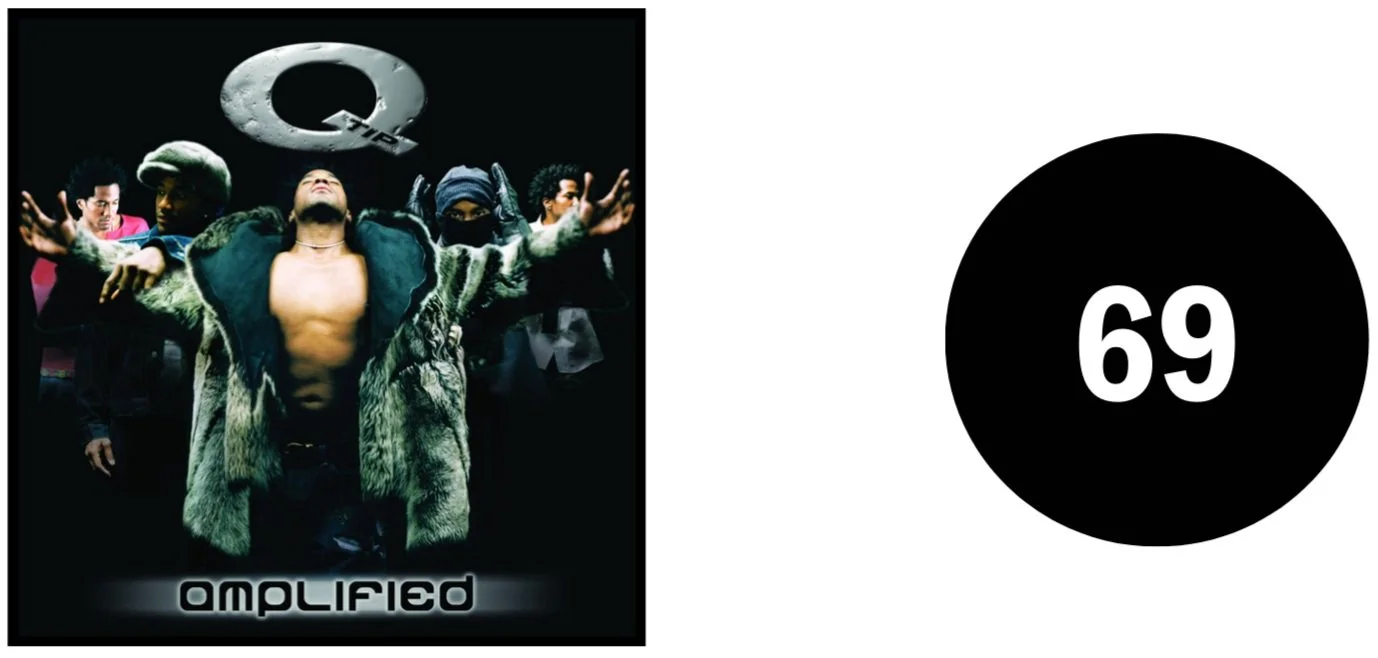Q-Tip — Amplified
Throwback Review | September 2024
Fresh from the disbandment of A Tribe Called Quest, Q-Tip started and embarked on his solo career. A creative shift away from the group’s usual sound, Amplified sadly missed the mark and wasn’t the debut that fans expected.
Q-Tip
With the golden generation of Hip-Hop widely regarded to be during the 1990s, A Tribe Called Quest were one of the biggest front runners delivering the best music during the genre’s best era. Having an unprecedented three album run with their first three albums, the group became one of the most well respected and highly influential Hip-Hop acts of the golden era. Q-Tip, the groups main producer and lead rapper along with Phife Dawg, is a beloved and influential figure to come out of 1990s. That being said, Q-Tip may still not fully gain the credit he truly deserves in comparison to other more popular Hip-Hop figures of the 1990s. Though he is known more and given more credit for his influential jazz-inspired production work that influenced future beat makers and producers from the likes of J Dilla, Pharrell Williams and Kanye West - Q-Tip is also arguably one of the best rappers of the 1990s. On the group’s debut album, People’s Instinctive Travels and Paths of Rhythm, Phife Dawg wasn’t heavily present in comparison to the group’s latter projects. This led to Q-Tip vocally being more present on the album, and along with his vocal contributions to the group’s latter projects, there is definitely a case to place Q-Tip on the list as one of the best rappers of the 1990s.
Commercially, Amplified is Q-Tip’s most successful solo album. With the album consisting of two of his most recognisable singles, “Breathe and Stop” and the album’s first single”Vivrant Thing”. Both single’s are fantastic and are two examples of the project’s biggest highlights. Accompanied by two music videos directed by the legendary Hype Williams, fans of A Tribe Called Quest may have been shocked to see Q-Tip’s new direction and look. There were no signs of Afrocentrism, instead Hip-Hop purists were seeing music videos that were reflective of what they despised, which was flashy materialism and a rapper surrounded by multiple video vixens. Unfortunately, they would also be disappointed with the album generally, as Q-Tip’s content doesn’t focus on social commentary or story telling. Instead, Amplified is reflective of an artist who is just having fun and is preoccupied with the opposite sex. Over two decades on, fans’ disappointment with Amplified is justified… to a degree.
Fan’s shock and disappointment may have ignored the fact that there are some really good gems on Amplified, especially with the album’s singles. “Vivrant Thing” definitely possesses the classic Q-Tip essence with how great it is sonically, though it might not be on the same level as “Bonita Applebum” - the second single from Tribe’s debut album - but it is just as flirtatious with its production and content. “Breathe and Stop” similarly to “Vivrant Thing” is another shift from the jazz-infused sounds from Tribe to a more dance and club friendly vibe - and it’s just as good as the first single and the shift in style was executed well. The third and final single, “Let’s Ride”, is an ode to Q-Tip’s love for driving a lovely car with a lady that looks just as good. Similar to the rest of the album, the single was produced by Q-Tip and his then protege J. Dilla, and its lovely production wise with it’s beautiful guitar sample of Joe Pass’s “Giant Steps”.
In terms of the album cuts, the best section of Amplified is largely the first six tracks and that includes “Breathe and Stop” and “Let’s Ride”. The intro track, “Wait Up”, consists of a more simple and straightforward piano loop with it’s production, but it’s a production highlight nonetheless. It also consists of Q-Tip’s best performance rapping wise, with rhymes like “You wanna shoot dice or wanna shoot rounds?, Wanna sell rhymes or wanna sell pounds?, The decision is yours. I'd rather see tours”. The following track “Higher” - which was a double-A-side single along with “Let’s Ride” - has a phenomenal groove and a catchy chorus, whilst the same can be said for the sixth track, “Things We Do”. Sadly, after “Things We Do” the album consists of tracks that don’t live up to the same quality that was set by the majority of the first half of the project. The only exception being “Vivrant Thing” and the final song, “Do It, See It, Be It”, which is actually a great closing track, with its themes focused on Q-Tip reflecting on his life and career, plus motivating the listener with its intro and chorus. Listening to it seems as if it was the inspiration behind Pharrell’s 2006 song, “ You Can Do It Too” off of Pharrell’s debut album, In My Mind. It’s a strong possibility as Pharrell has previously described Q-Tip and A Tribe Called Quest as his inspirations.
As mentioned - and besides from the tracks mentioned above - the rest of Amplified consists of songs that are just passable. Though being a great producer himself, and being behind the boards with J Dilla - who is one of the greatest beat makers of all time - there are quite a few lacklustre instrumentals on the album. The fifth track “Do It” is the best example of this, as it consists of a beat that hasn’t aged gracefully and sounds like a generic Hip-Hop beat from 1999. Truthfully, the same can also be said for “Go Hard” the album’s eighth track. There aren’t many guest appearances on Amplified, only two from Busta Rhymes and the Nu-Metal band, Korn. Bust Rhymes wasn’t a stranger to collaborating with Q-Tip, as his first appearance with Q-Tip goes all the way back to 1991 with his iconic performance on Tribe’s “Scenario”. However, on “N.T.”, Busta sadly doesn’t deliver a memorable performance, and he also provides a small but cringe worthy monologue at the end.
Q-Tip and Busta Rhymes
Unlike Busta Rhymes, this project marked Korn’s first and so far only musical output with Q-Tip, with the track “End Of Time”. At the time, Nu-Metal was quickly becoming the biggest sub-genre within Rock music and by the time of Amplified’s release Korn just went number one for the second time with their third album, Issues. That makes you wonder whether the motivation for Korn’s inclusion on Amplified was inspired by making creative music or just because they were one of the most popular musical acts at the time, and Nu-Metal was this new and controversial sub-genre that was becoming increasingly popular. On paper, the idea of Q-Tip and Korn collaborating makes no sense and it most likely had fans scratching their heads in 1999, when they saw the tracklist on the album’s back cover. Though, “End Of Time” is surprisingly not as bad as you think it might be, but for the most part it just doesn’t work nor do Q-Tip and Korn match well together.
So what is the legacy of Amplified? For most it’s remembered as a bump in Q-Tip’s illustrious career, and with Q-Tip’s follow up album - 2008’s The Renaissance - being highly regarded upon its release, The Renaissance is most likely viewed by fans as the album where Q-Tip got it right when it comes to his solo output. Though Amplified has a fair bit of rough spots, it’s worth noting that this album isn’t as bad as people claim it to be or think they remember it to be. Amplified does suffer from being released so close after Tribe’s split, and with the group being so loved for their style and heralded for their first three albums, you can imagine how hard it was for fans to be open and receptive to Q-Tip’s stylistic change and pursuit for a more relevant and commercial sound. Fans are not missing out immensely if they still wish to avoid this project, but if they are willing to give this album another spin - almost a quarter of a century since its release - they might actually be surprised by how much they like it more than they did back in 1999.




